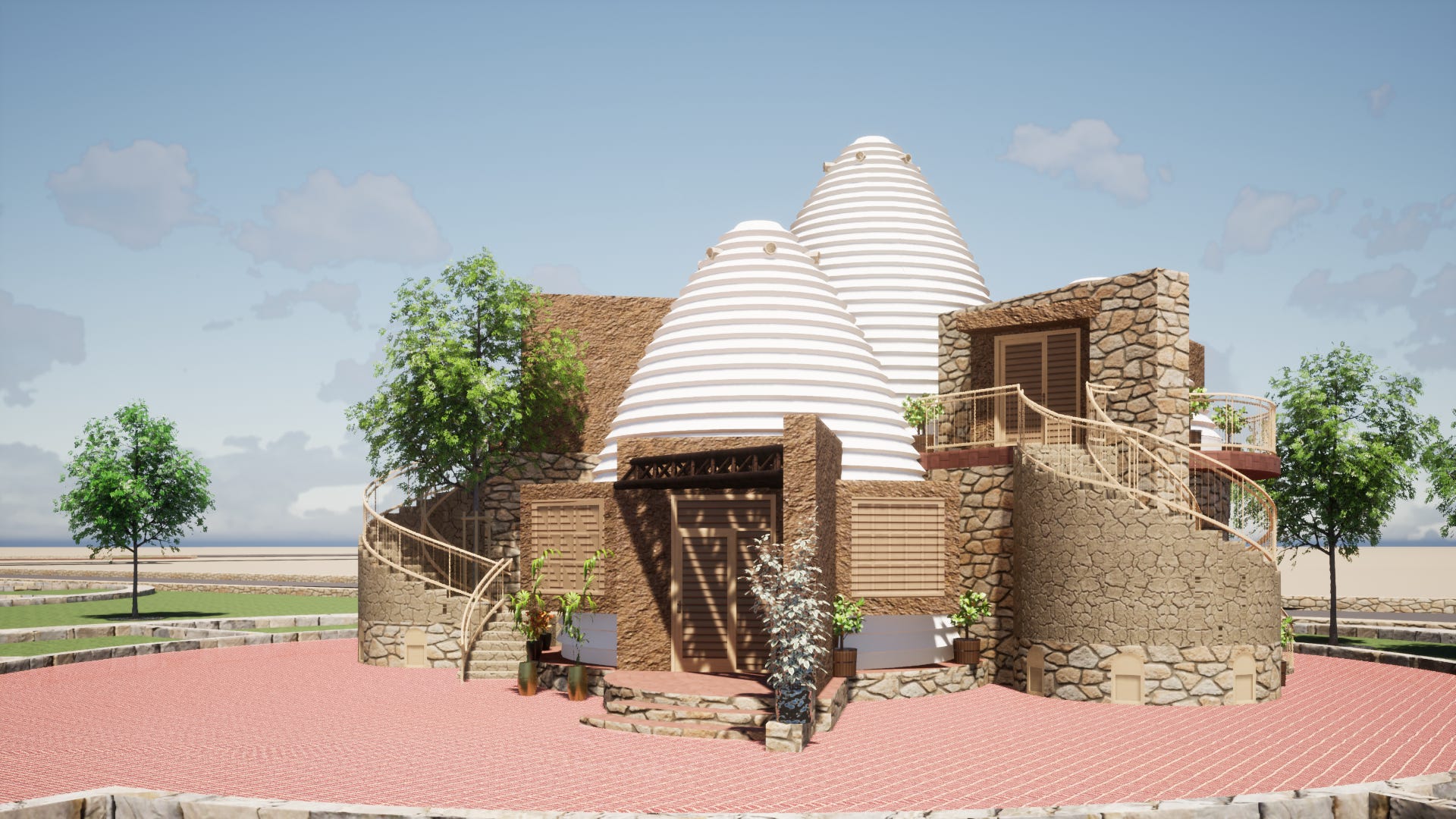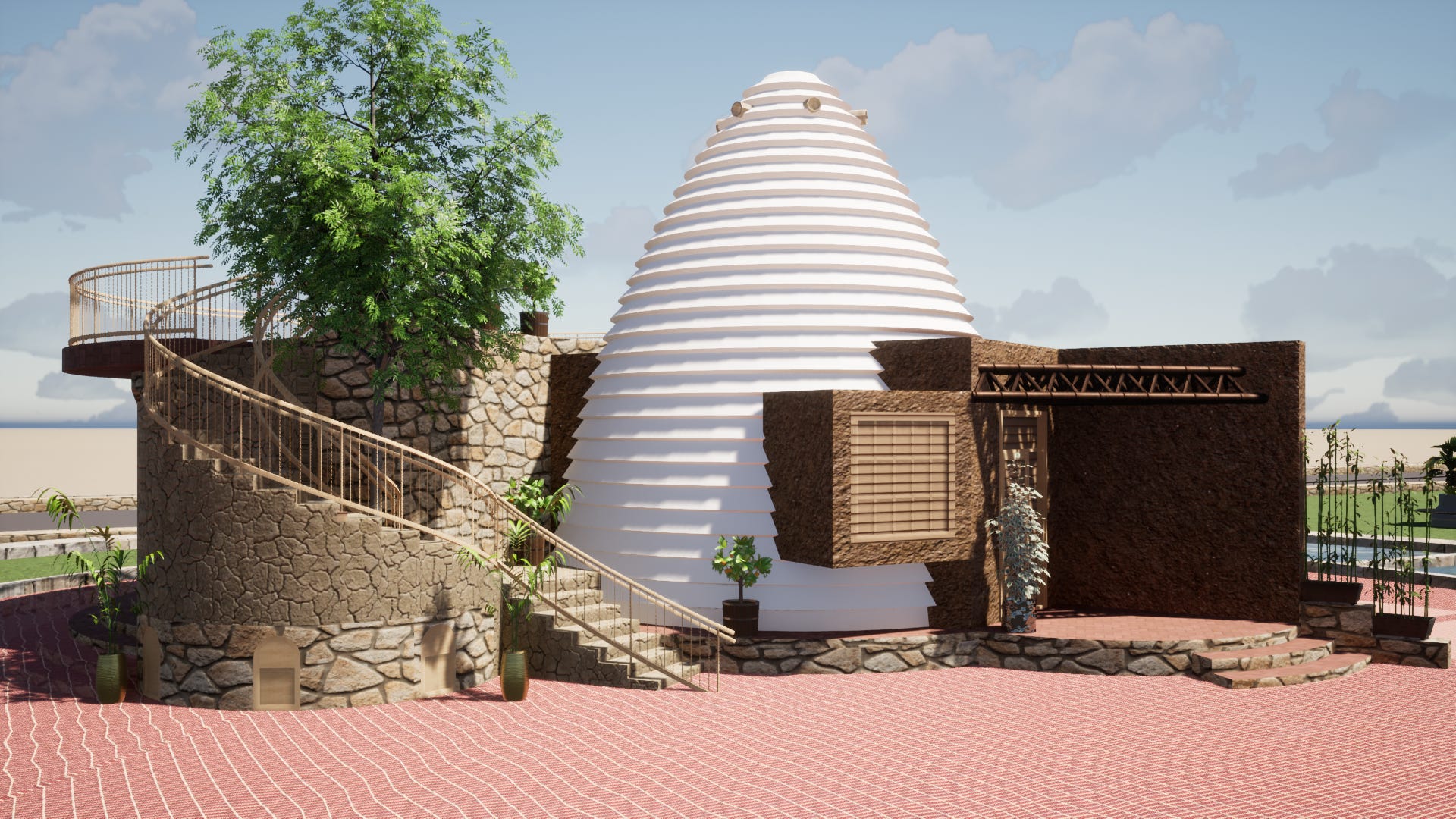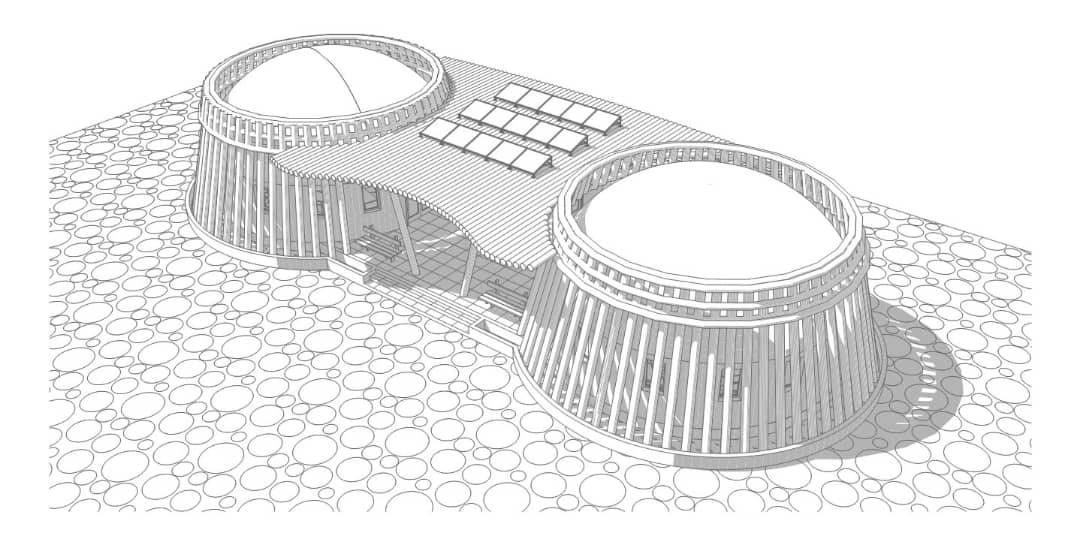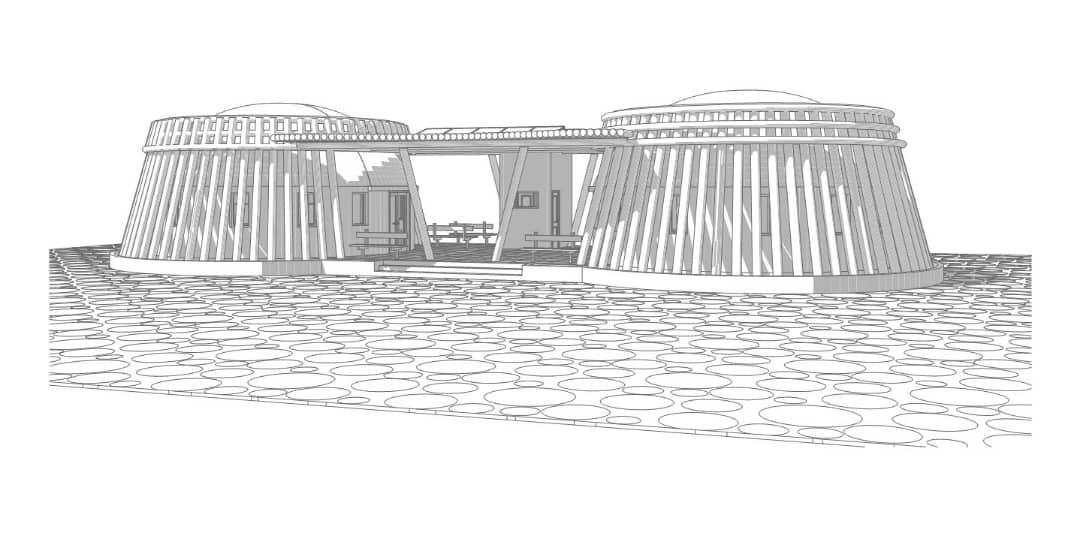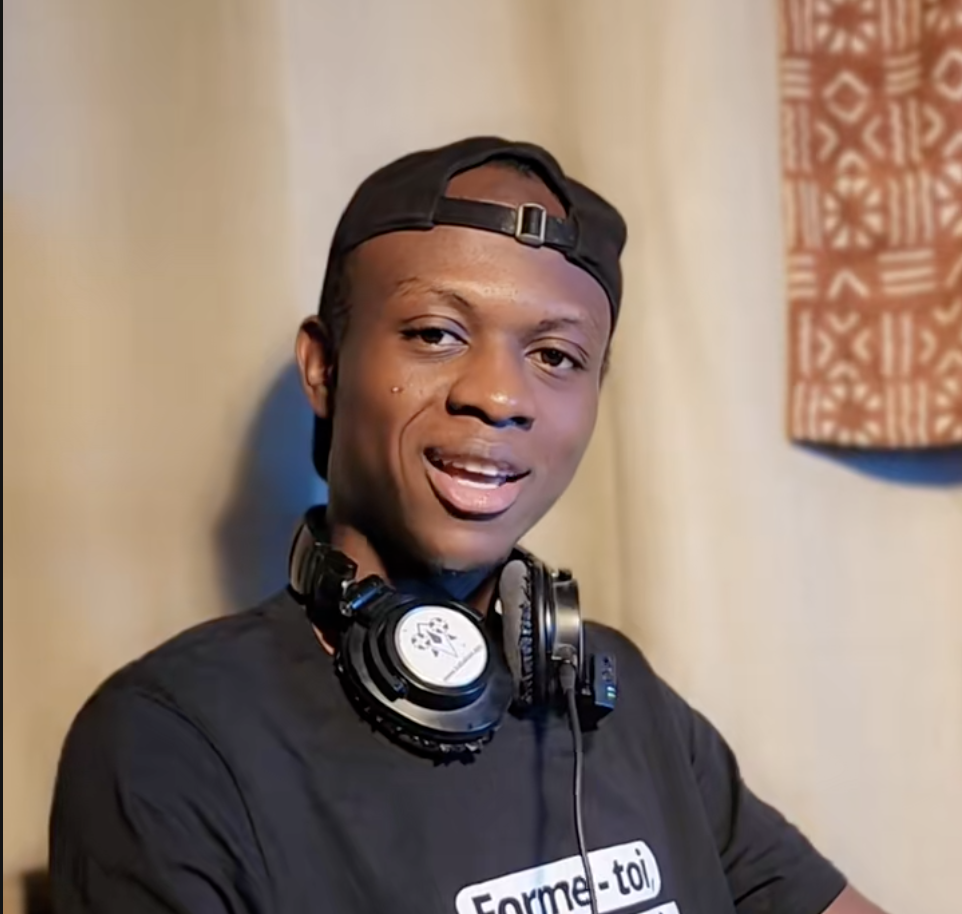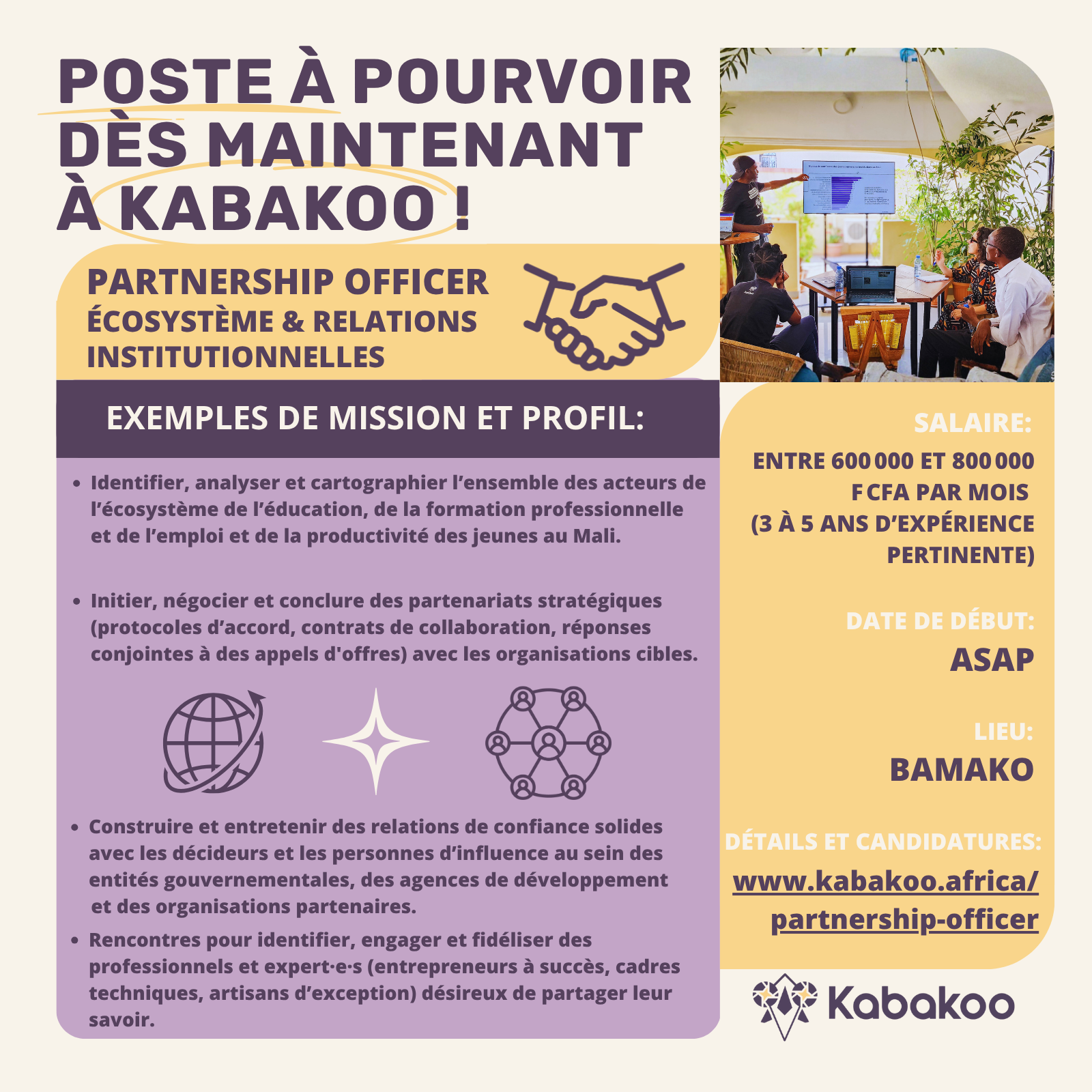This newsletter is written to be read, enjoyed, and shared. If you reply to it, we will respond back.🌞
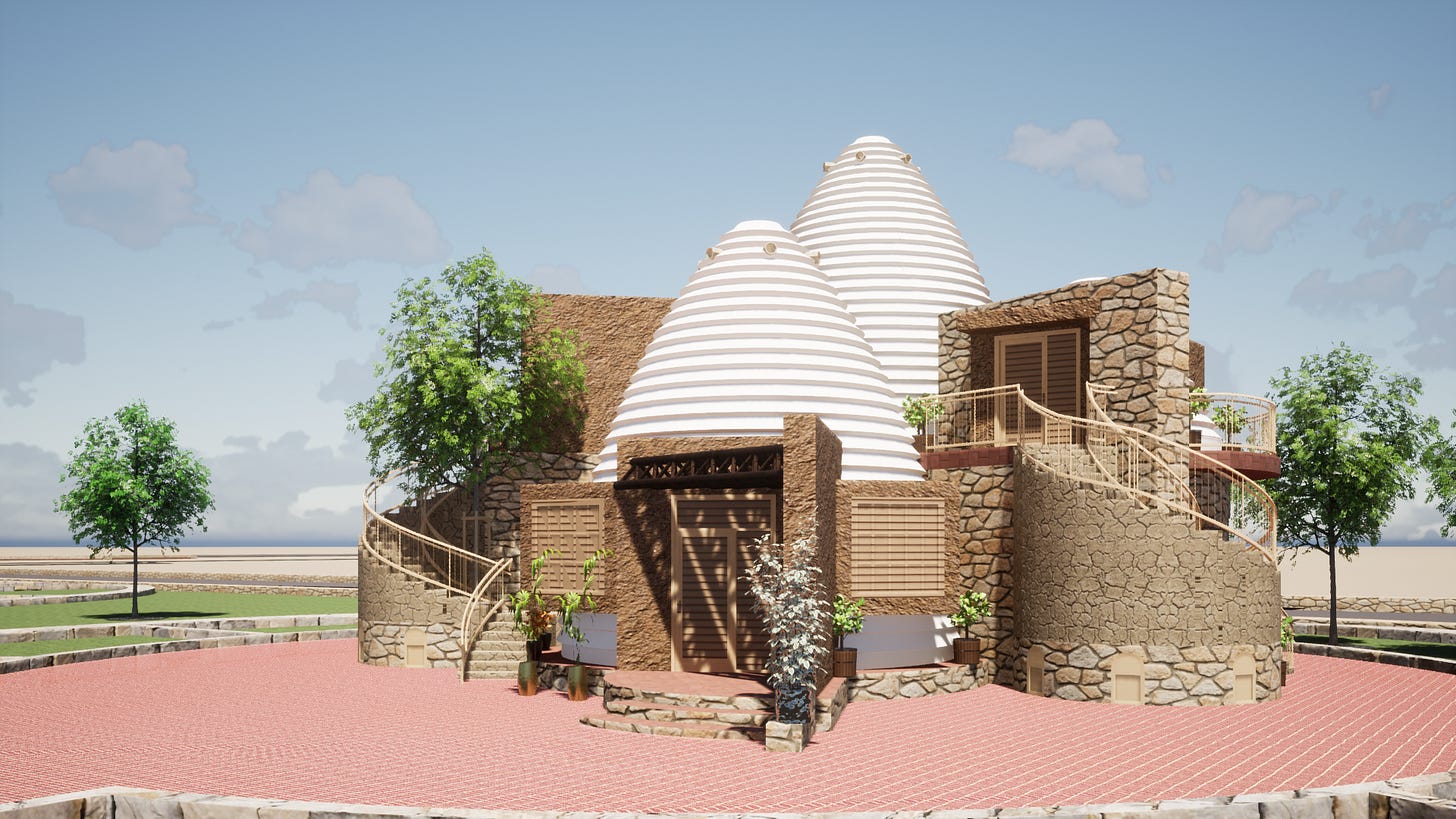
In this 7th newsletter 📰 from the Innovation Lab: Regenerative Futures in the Sahel, we share with you news of the launch of the second phase of the training program on regenerative architecture and extended reality. After 4 exciting months of activities focused on the discovery of regenerative architecture and its specificities and potentials in the Sahel, learners are now embarking on a phase of discovery and experimentation with extended reality for highdigenous architecture! 🎉
Everything reported below happened during the month of January 2024 😉.
Some highlights from the second phase of the Regenerative Architecture & XR training 🚀
The curriculum for the second phase of the cohort comprises 3 workshops: Architectural Design Workshop, Agri-Tecture Practice Workshop and Immersive Tech Workshop. In the following, we'll share with you the dynamics of each of these workshops; and yes, we really mean “agri-tecture”.
Architectural Design Workshop : Finalizing the regenerative architecture prototypes 📐
During the month of December, the learners had already begun sketching out their regenerative architecture prototypes, exploring the various possibilities for innovation with local materials, endogenous architectural cultures, and all the themes they had the opportunity to tackle during the first phase of the training with different mentors. During the month of January, the learners made remarkable progress in the design of their prototypes.
Their sketches and experiments resulted in innovative architectural projects drawing on endogenous cultures and contemporary architecture.
These prototypes are thus attempts to produce contemporary architecture adapted to the specific characteristics of the Sahel, particularly in terms of climatic changes, local cultures, available materials, and so on. The 3D models created by the learners will form the basis for the development of their immersive experiences.
Agri-Tecture Practice Workshop : Exploring bamboo, stone and earth and discovering the specificities of soil for agriculture 🎋
One of the major characteristics of regenerative architecture is that it is alive, in harmony with its natural environment, and has a positive impact on it. And one of the most accessible ways of achieving this is through urban and architectural agriculture, which we call AgriTecture. To this end, a whole practical module on regenerative architectural and agricultural practices was launched in January.
During these workshops, learners are accompanied by mentors Mamadou Koné, an architect with expertise in the restoration of Sahelian built heritage, and Oumar Diabaté, a veterinary doctor and farmer with expertise in organic agriculture and agroecology.
With Mamadou Koné, the learners are building a camping pod, designed at the Innovation Lab entirely with local materials: earth and stone foundations, bamboo support structure, and earth and straw envelope. It's an opportunity to test their materials with different endogenous and contemporary techniques. Among the highlights of these architectural experiments, the learners were able to collaborate with a craftsman who makes wooden furniture. This craftsman taught the learners impressive techniques for assembling bamboo using local plant fibers. The learners will be continuing their architectural experiments with local materials to complete the camping pod.
With Oumar Diabaté, the aim of the first workshops was to introduce learners to regenerative urban agriculture. They visited the mentor's organic farm in Bamako to discover different organic and agroecological farming techniques in line with regenerative approaches. They also worked on the design and planning of regenerative urban gardens integrated into the city, taking into account the specificities and conditions of effective circular integration. In the workshops that followed, the learners, assisted by their mentor, were able to delve deeper into the techniques of organic agriculture in an urban fabric, exploring in particular the nature of the soil, and the means of protecting, conserving and regenerating it, notably by drawing inspiration from endogenous techniques such as zai. Future challenges include experimenting with techniques to facilitate the integration of agriculture on an architectural scale.
Immersive Tech Workshop : Discovering XR 👓
As planned, this second phase of the cohort is focused on extended reality and its use for regenerative architecture, particularly the potential it has to immerse people in alternative possibilities. In order for learners to dig deeper into this potential, extended reality self-learning workshops have been carried out for the first time. Their aim is to familiarize learners with these emerging technologies, their history, evolution, usefulness, tools and gadgets. Learners were able to draw up research projects illustrating the use of augmented and virtual reality in architecture, so that they could then draw inspiration from them to develop immersive experiences based on their architectural prototypes. They were also able to meet several representatives of African communities that have been promoting extended reality for years, especially in Nigeria and Senegal, with the goal of learning from their experiences and learning paths.
📢 Engaging with the community, building the movement 🛠️
Wednesday’s Masterclass Ritual: Housing and the restructuring of precarious neighborhoods in the Sahel
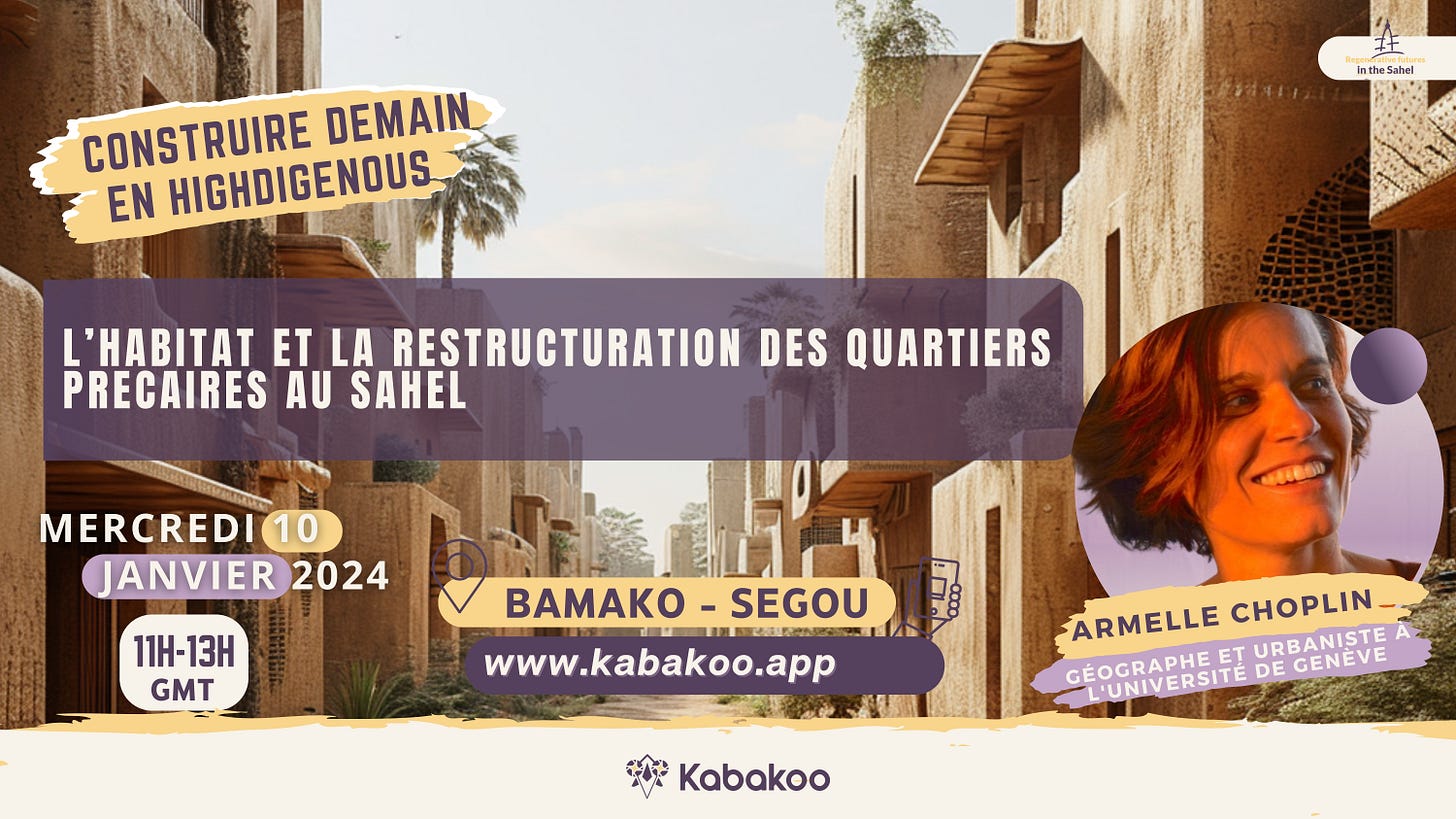
This masterclass follows on from the cohort's module, Peasant Cities, Cities of Tomorrow, to reflect on the Sahelian city of tomorrow and its development model. Armelle Choplin, urban planner-geographer and professor at the University of Geneva, met with the learners to discuss the dynamics of interventions in precarious neighborhoods, in particular those carried out by international cooperation agencies, in order to reflect on their effectiveness and impact.
How can these neighborhoods be restructured to improve living conditions?
Exchanges and simulation exercises based on Sahelian cities, as well as Armelle's sharing of experiences, enabled learners to appreciate the urban complexity and the considerations to be taken into account in this type of intervention, particularly with regard to land tenure, social, environmental and political aspects. Can we talk of regenerating these precarious neighborhoods, and undertake initiatives that place greater emphasis on the dignity of the residents, the social and cultural ties they have forged in these neighborhoods, the economies they have developed, etc.? The subject is certainly interesting and will be explored further in the Innovation Lab
Second masterclass of the month : Extended Reality in Africa: Changing the technology narratives
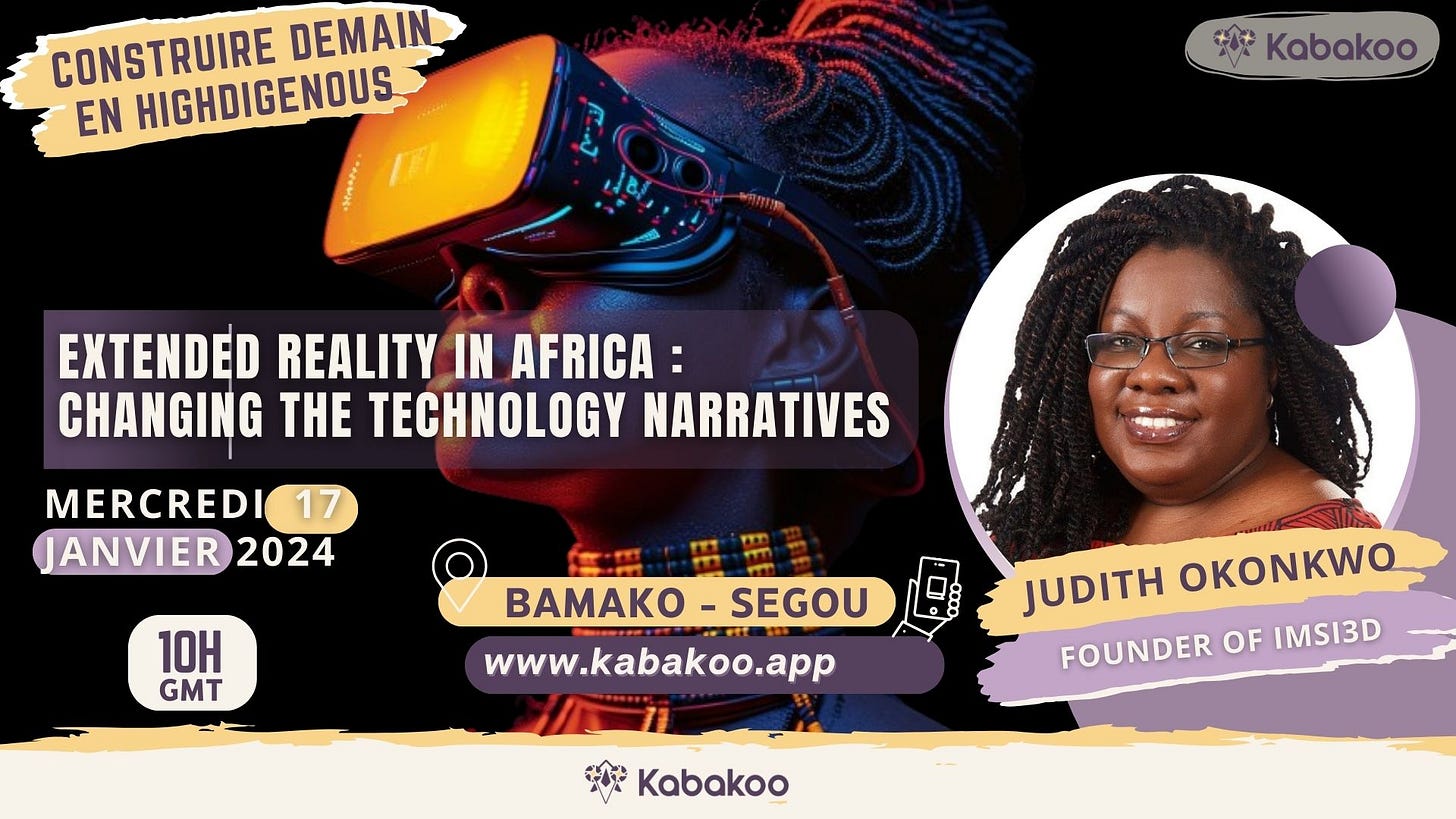
This masterclass was held with Aiyenuro Oluwaseun, representing Judith Okonkwo, founder of Imisi3D, an Extended Reality (XR) creation lab focused on building the XR ecosystem in Africa. This meeting was an opportunity to introduce the Kabakoo community, which aspires to develop its skills in immersive technologies, to the Imisi3D learning community. Working in the XR space and with a background in architecture, Aiyenuro shared with the learners his experience of learning extended reality technologies, the various obstacles he encountered, and emphasized the importance of being part of a learning community and collaborating to achieve and exceed learning objectives. By also sharing various architectural works, Aiyenuro demonstrated to learners how immersive technologies are changing and even revolutionizing architectural practices in Nigeria specifically, and in several international contexts. The new possibilities offered to customers, enabling them to immerse themselves in their future home even before construction begins, make it much easier to communicate and understand the needs of users or residents.
The discussion also addressed the areas in which extended reality could be used, particularly those in which Imisi3D is interested. Among the latter, learners were particularly interested in what extended reality could bring to built cultural heritage, especially in the Sahelian context. Making certain sites, rich in history, culture and heritage, virtually accessible could indeed be of interest to many people.
💡 Masterclass : Developing extended reality learning communities in the Sahel
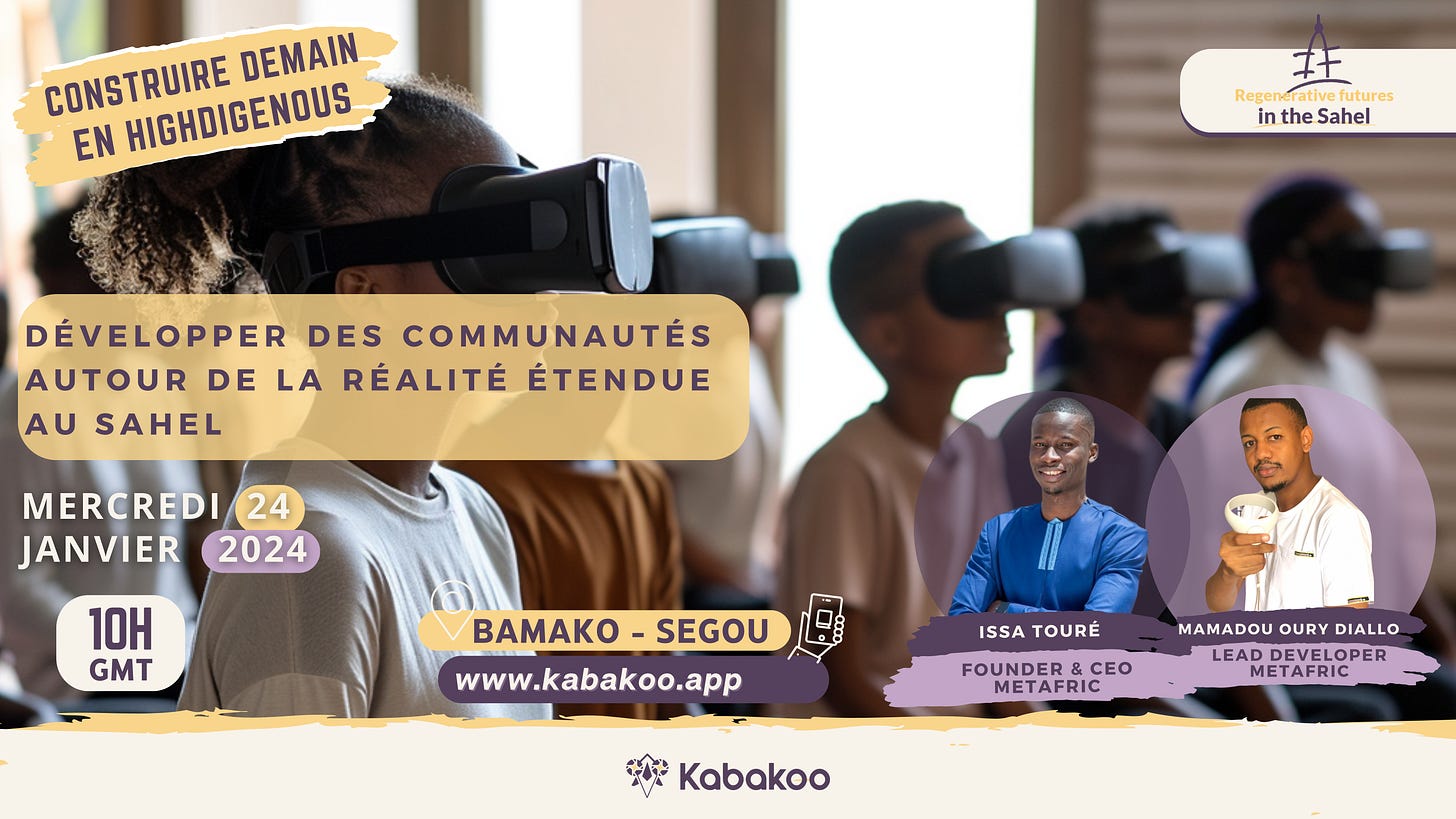
This meeting with Issa Touré, founder and CEO of METAFRIK, an extended reality learning and promotion community based in Dakar, and Mamadou Oury Diallo, Lead XR Developer at METAFRIK, had as its main objective to meet and discuss with a community with experience in XR learning in the Sahel. A very rich discussion took place between the speakers and the learners, particularly around the 3D modeling of Sahelian cities and the possible use of this to imagine alternative futures for the development and evolution of these cities. The debate also focused on the importance of democratizing the use of and access to these emerging technologies, particularly in African contexts, as well as the importance of forging links between the various communities that are trying to build up this emerging ecosystem.
Fourth masterclass of the month : XR and its Potential for Architecture and Cities 🇳🇬
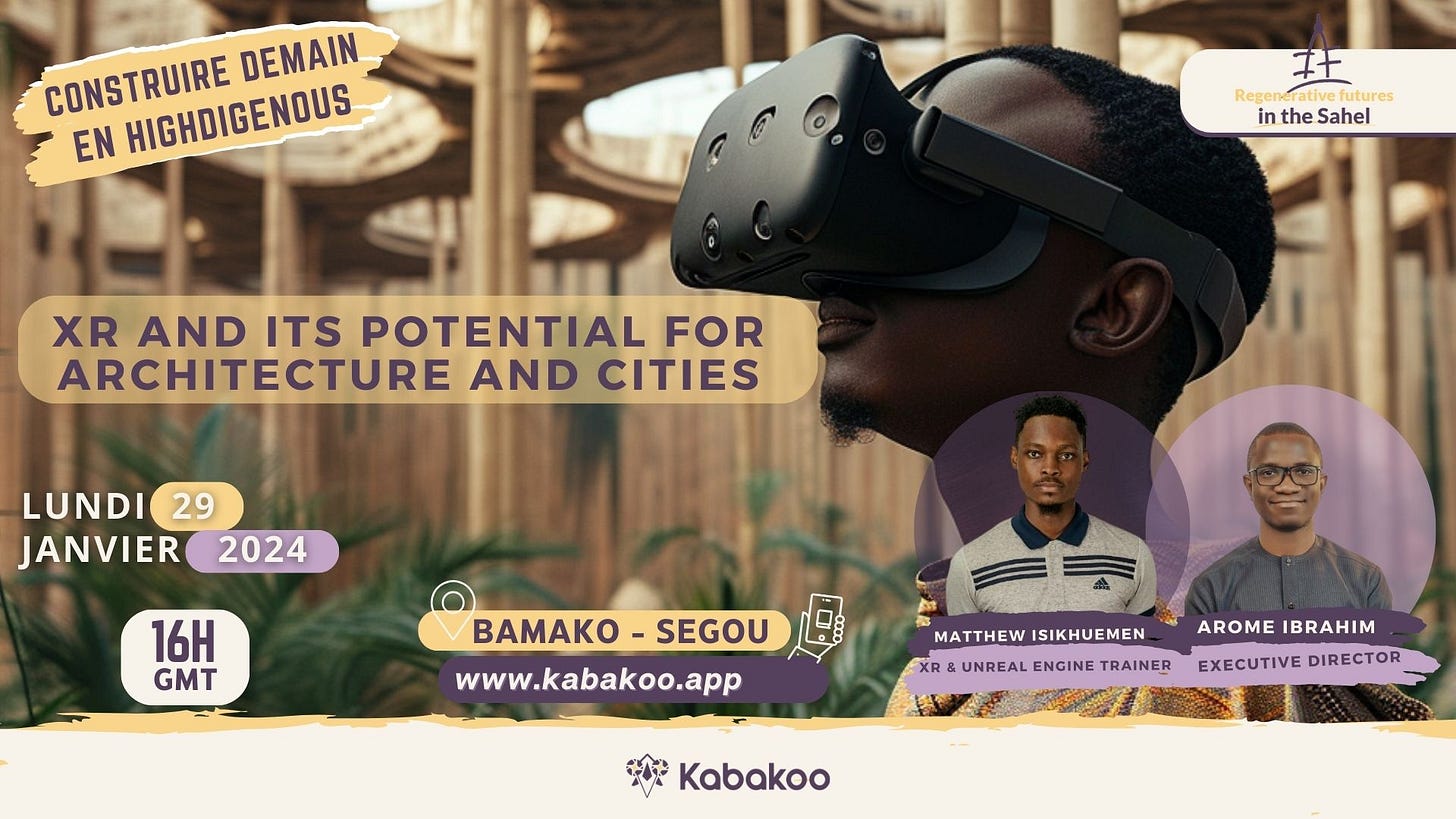
This fourth masterclass of January was with Arome Ibrahim, Executive Director of Immersive Tech Africa, and Matthew Isikhuemen, XR & Unreal Engine Trainer, also at Immersive Tech Africa which is a non-profit organization dedicated to democratizing and improving access to Extended Reality (XR) technology through education, training and research programs, fostering a thriving and inclusive XR community in Africa. Matthew has a background in architecture, and shared with the learners some very interesting examples of how he has used virtual reality in this field, especially in Nigeria. Arome also shared some very inspiring thoughts on Immersive Tech Africa's activities and the importance of gender inclusion in access to these technologies. Discussions like this enable our community to keep a close eye on the evolution and dynamics of this sector on the continent, and to position ourselves strategically.
Masterclass : An entrepreneurial adventure in ecological earth construction: Ecodome Maroc 🇲🇦
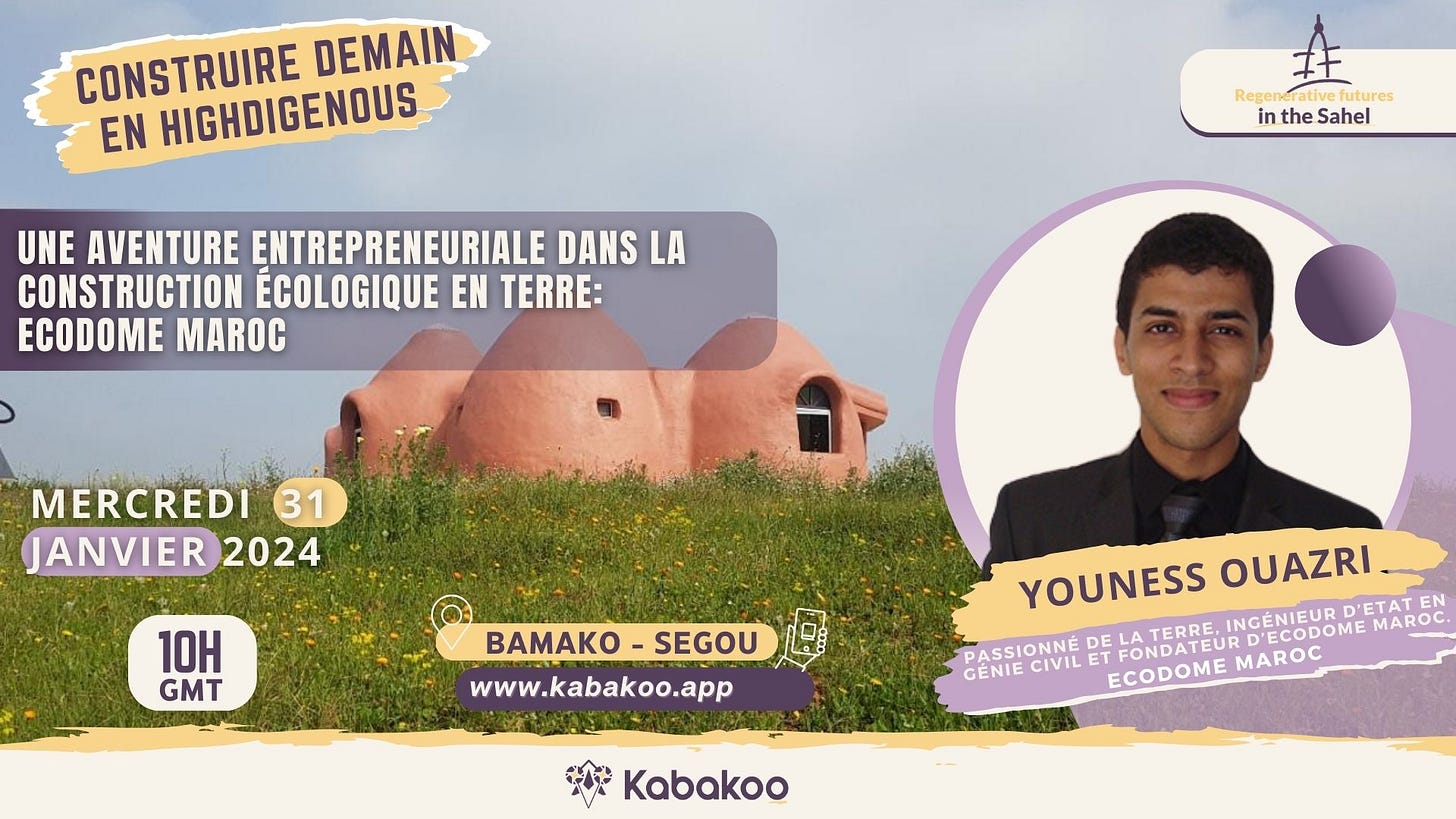
As we approach the end of this cohort, there is a strong emphasis on the entrepreneurial spirit of the learners. To this end, we have organized a masterclass with Youness Ouazri, founder of Ecodome Maroc, a company specializing in the ecological construction of houses and infrastructure for rural tourism, using mainly local materials such as earth. It was an opportunity for the learners to discover an entrepreneurial journey of creating a team and a company specialized in building with earth in a contemporary way. Indeed, the Ecodome Maroc team has succeeded in adapting ancient earth construction techniques to contemporary standards and technical studies to create buildings that are highly energy-efficient, highly resilient to natural phenomena (mainly earthquakes) and that solve problems of access to infrastructure in isolated areas. A very highdigenous approach!
It was also an opportunity for the learners to understand how an innovative, highdigenous architectural prototype can be used to influence the social status of local materials, and gain access to the ecological and regenerative construction market in the Sahel.
🎉 Upcoming Teasers:
During the month of February, learners will focus on learning about extended reality technologies and tools, and then developing immersive experiences based on their architectural prototypes developed in the Architectural Design Workshop.
With Love & Hope from Bamako 💜💛


